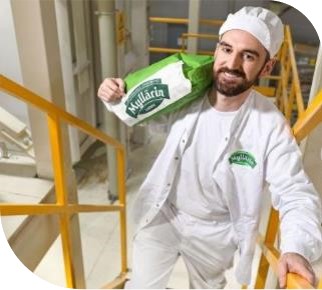About
Helsinki Mills Ltd. is Finland’s largest organic grain processor and a traditional family-owned company that has been manufacturing grain products for over 85 years. The company develops, markets and sells various grain products to consumers, the food industry, food service, food distributors and bakeries. Locally sourced, Finnish grains are the primary raw material, including wheat, rye, barley, and oats and Helsinki Mills uses them to make flour, flakes, porridges, mueslis, cereals and meal ingredients. Helsinki Mills has manufactured organic products for more than 25 years, and nowadays it is Finland’s largest producer of organic grain products. Around one-third of the products Helsinki Mills manufactures are organic. In recent years, oats have played a larger role, and the company has specialized in gluten-free oat products. Exports are a key strategic focus for Helsinki Mills. Today, exports represent as much as around 35 percent of the total turnover. Helsinki Mills products, including flakes, oatmeal, bran, porridges, flours, baking goods and breakfast cereals are now available in some 50 countries around the world.

Why it is a good practice?
Environmental matters and sustainability were important to Helsinki Mills long before that became a trend. Environmental friendliness is demonstrated by e.g. the fact that since 2020, the mill process has been completely carbon-neutral, and all production facilities only use green electricity. Helsinki Mills considers the environment also when choosing packaging materials. Mills produce very little landfill waste, because the waste produced during grain cleaning is waste-to-energy waste, and packaging materials are recycled as
cardboard or as waste-to-energy waste. Helsinki Mills is committed to the UN’s sustainable development goals and continually develops operations to safeguard food and well-being in the best way possible. Helsinki Mills is a good choice for a number of reasons, such as:
production is carbon-neutral
-products are made from pure, Finnish grain
-company only uses renewable energy in manufacturing
-range includes plenty of gluten-free and organic products
-all of the products are vegan
-company is committed to reducing the use of plastic in packaging
-company donates any waste generated during production to charity, or sends it to be reused
-company complies with international standards in quality and product safety
-company continually develops new, healthy and climate-friendly alternatives for breakfasts, snacks, and the dinner table
Read more: Helsinki Mills Sustainability Report
Sustainable
Domesticity and transparency are important to Helsinki Mills Ltd. As a mill, a sustainable and resilient economy that benefits both people and nature is at the core of a vision. Helsinki Mills wants to ensure the future of food production and reduce the environmental impact of operations. Farming, and thereby also the availability of the most important raw materials, are affected by extreme weather phenomena and impoverished soil, as well as species loss, which must be slowed. That’s why it is so important to commit to sustainable development and to continually develop work to safeguard food and wellbeing in the best way possible.

Healthy
Helsinki Mills has produced nothing but plant-based food since 1934 and has done its best to offer easy and healthy alternatives for modern consumers. Following a plant-based diet is sustainable eating. Grain-based products are a great part of a vegetarian diet, and Helsinki Mills aims to offer a wide range of healthy grain products for different uses – without compromising on flavour or quality.
Ethical
Helsinki Mills has calculated the carbon footprint produced by the energy consumption of their mills. The mills’ combined carbon footprint (calculated to a precision of Greenhouse Gas Protocol scope 2) in 2021 was 120 tonnes, which corresponds to the annual emissions of 10 average Finns. For years, Helsinki Mills has used green electricity and generated the thermal energy required for producing flakes by burning oat hull waste in its own biopower plant, which has helped
to reduce its carbon footprint. It is not possible for Helsinki Mills to further reduce the carbon footprint, so they have decided to compensate for carbon emissions by investing in measures to slow the impact of climate change. Each year, they make a compensation payment. In 2021, emissions were offset by forest-based carbon sinks in Finland through Green Carbon
Helsinki Mills has also investigated the life-cycle footprint for oats from field to store shelf, which allows to calculate the carbon footprint of individual oat products made at the mill. This work is still ongoing, but completely carbon-neutral oat products will be available on store shelves in the future. The company’s business activities of course involve many other operations, such as transport, warehousing and office work, and the environmental impact of this is being investigated. Once Helsinki Mills has calculated these impacts, the company can strive to reduce them and, if necessary, compensate for them through climate projects.